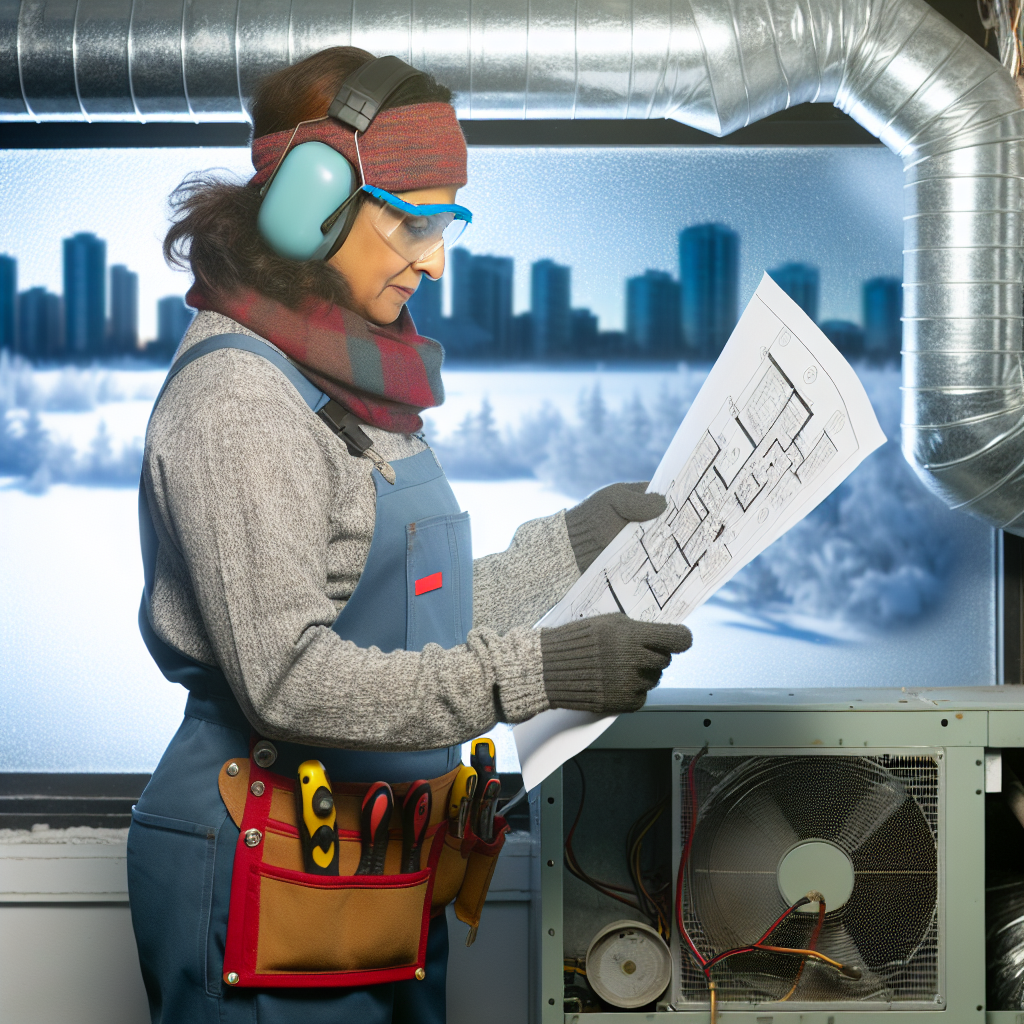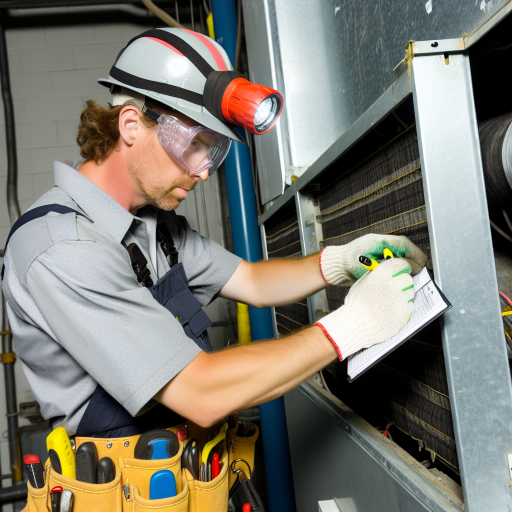Overview of HVAC Technician Salary Trends in Canada
Current Salary Scale
The salary of HVAC technicians in Canada has seen notable growth in recent years.
On average, technicians earn between $50,000 and $80,000 annually.
Factors like experience and certifications significantly affect salary levels.
Regional Variations
Different provinces demonstrate varying salary ranges.
For example, technicians in Alberta often earn higher wages than those in Manitoba.
This disparity can be attributed to demand and cost of living differences.
Comparative Analysis with Other Trades
When compared to other skilled trades, HVAC salaries are competitive.
Technicians often earn more than electricians but slightly less than plumbers.
As demand for HVAC services rises, salaries are expected to increase further.
Impact of Certification and Training
Obtaining additional certifications can lead to higher pay rates.
Certifications such as the HVAC Excellence or NATE can enhance job prospects.
Trained technicians often command a premium for their expertise.
Benefits and Incentives
Many employers offer additional benefits beyond salary.
Common perks include health insurance, retirement plans, and paid time off.
Some companies also provide bonuses and incentives tied to performance.
Factors Influencing HVAC Technician Salaries
Experience Level
Experience plays a vital role in determining salary levels for HVAC technicians.
Entry-level technicians earn less than those with several years of experience.
As technicians gain skills and expertise, their earning potential increases significantly.
Geographic Location
Geographic location greatly affects HVAC salaries across the country.
Areas with high demand for HVAC services typically offer higher wages.
Urban centers often pay more compared to rural areas.
Industry Demand
The overall demand for HVAC services impacts technician salaries directly.
During peak seasons, technicians may earn overtime pay and bonuses.
Increased construction activity also raises the demand for qualified technicians.
Certifications and Specializations
Certifications can significantly boost an HVAC technician’s salary potential.
Unlock Your Career Potential
Visualize a clear path to success with our tailored Career Consulting service. Personalized insights in just 1-3 days.
Get StartedSpecialized skills, such as refrigeration or system design, command higher pay.
Employers value technicians who pursue ongoing education and training.
Company Size and Type
The size and type of company influence HVAC technician salaries as well.
Large corporations tend to offer better pay and benefits than small businesses.
Specialty companies often provide higher salaries due to specific skill requirements.
Benefits and Perks
In addition to salaries, benefits play an essential role in compensation.
Many HVAC companies offer healthcare, retirement plans, and paid time off.
Training opportunities and advancement prospects also attract top talent.
Regional Salary Variations for HVAC Technicians Across Canada
Overview of HVAC Technician Salaries
HVAC technician salaries vary significantly across Canada.
Several factors influence these differences, including regional demand and cost of living.
Typically, urban areas offer higher salaries compared to rural regions.
Salary Variations by Region
In British Columbia, HVAC technicians earn some of the highest salaries in Canada.
In cities like Vancouver, the cost of living drives up wages.
Conversely, technicians in the interior may earn less due to lower demand.
Ontario also shows notable regional differences.
Toronto technicians see higher wages due to a booming job market.
However, in smaller cities like Thunder Bay, salaries decrease considerably.
Quebec’s HVAC salary landscape varies between urban and rural settings.
Montreal presents attractive pay prospects, thriving on industry demands.
Meanwhile, smaller towns may offer less competitive wages.
Factors Impacting Salaries
Experience plays a crucial role in determining HVAC technician salaries.
Technicians with several years of hands-on experience command higher pay.
Certifications and specialized skills can also enhance earning potential.
Additionally, the economic climate affects salary levels.
During periods of high demand, wages typically increase to attract qualified workers.
However, during economic downturns, wages may stagnate or decline.
Benefits and Additional Compensation
Many HVAC technicians receive benefits alongside their base salary.
Common benefits include health insurance, retirement plans, and paid vacations.
Some employers offer incentives for performance and overtime work.
By understanding these variations, technicians can make informed career decisions.
Discover More: Exploring the Future of HVAC Technology and Its Impact
Comparative Analysis: HVAC Technician Salaries vs. Other Skilled Trades
Overview of HVAC Technician Salaries
HVAC technicians earn a competitive salary in the skilled trades sector.
The average salary for HVAC technicians varies by region.
Many technicians enjoy additional benefits beyond their base pay.
Comparison with Electricians
Electricians typically earn a salary similar to HVAC technicians.
Many electricians have the opportunity for overtime, increasing overall earnings.
However, benefits packages may differ significantly between the trades.
Comparison with Plumbers
Plumbers often command higher average salaries than HVAC technicians.
Despite this, HVAC technicians can expect steady employment with seasonal demand.
Both trades require specialized training and licensing to operate.
Comparison with Carpenters
Carpenters generally earn less than HVAC technicians at the start of their careers.
However, experienced carpenters may reach comparable salary levels over time.
Job stability is strong in both professions, though demand varies by project.
Regional Salary Variability
Salaries for HVAC technicians can vary greatly by location.
Urban areas typically offer higher wages due to increased demand.
Conversely, rural areas often present fewer opportunities but lower living costs.
Benefits Overview for HVAC Technicians
Benefits commonly include health insurance and retirement plans.
Many technicians also receive paid vacation and sick leave.
Additional perks such as continuing education reimbursements may be available.
Gain More Insights: Challenges and Rewards in the Metal Fabrication Industry
Average Salary by Experience Level
Entry-Level HVAC Technicians
Entry-level HVAC technicians can expect to earn a modest salary.
Typically, salaries range from $30,000 to $40,000 annually.
New technicians often gain valuable hands-on experience.
This experience helps them to increase their earning potential over time.
Additionally, entry-level positions often offer training opportunities.
Mid-Level HVAC Technicians
Mid-level HVAC technicians see a significant salary increase.
On average, they earn between $45,000 and $60,000 each year.
These technicians have typically accumulated several years of experience.
As a result, they often take on more complex projects.
Moreover, many mid-level technicians specialize in certain areas.
This specialization can further boost their earning potential.
Senior HVAC Technicians
Senior HVAC technicians enjoy the highest salaries in the field.
Their annual earnings can range from $65,000 to $100,000 or more.
Years of experience contribute to their advanced skill set.
They often supervise junior technicians and manage projects.
Furthermore, senior technicians may work in specialized sectors.
These sectors often offer higher pay rates and additional benefits.
Factors Influencing Salary
Several key factors influence HVAC technician salaries.
Geographic location plays a major role in salary differences.
Certain regions have higher demand for HVAC services.
Experience and certifications also significantly impact salary levels.
Technicians with specialized certifications tend to earn more.
Finally, the type of employer can affect salary ranges.
For example, independent contractors may charge more than larger companies.
Explore Further: Exploring Different Materials Used in Upholstery Work

Benefits Typically Offered to HVAC Technicians
Health Insurance
Health insurance is a vital benefit for HVAC technicians.
This coverage often includes medical, dental, and vision care.
Companies usually provide various plans to choose from.
Employees can select the coverage that best suits their needs.
Retirement Plans
Retirement plans help HVAC technicians prepare for the future.
Many employers offer 401(k) plans with matching contributions.
This incentive encourages technicians to save for retirement.
Some companies even provide pension plans for added security.
Paid Time Off
Paid time off (PTO) is a significant benefit for technicians.
Employers typically grant vacation days and holidays.
In addition, sick leave is common in many HVAC positions.
Paid time off fosters a healthy work-life balance.
Training and Certification
Continuous training opportunities are essential in this field.
Employers often pay for certification courses for technicians.
This investment improves skills and enhances career prospects.
Technicians stay updated on industry standards and technologies.
Tools and Equipment
Employers usually provide essential tools and equipment for technicians.
This support helps technicians perform their jobs effectively.
Some companies even offer maintenance for their tools.
This benefit reduces personal costs associated with job requirements.
Flexible Scheduling
Flexible scheduling is often available to HVAC technicians.
This arrangement allows workers to balance personal commitments.
It enhances job satisfaction and improves overall productivity.
Many companies value the importance of work-life integration.
Performance Bonuses
Performance bonuses motivate HVAC technicians to excel.
Companies frequently reward employees for outstanding work.
This acknowledgment encourages higher productivity levels.
Bonuses can also enhance employee morale and job satisfaction.
Uncover the Details: The Rise of Smart Construction: How Technology is Changing Trade Jobs in Canada
Impact of Certification and Education on Salary Expectations
Understanding the Importance of Certification
Certification plays a crucial role in the HVAC industry.
It validates a technician’s skills and knowledge in heating, ventilation, and air conditioning.
Employers often prefer certified technicians for their expertise.
Furthermore, certification may lead to higher salary offers.
Many states require specific certifications to ensure safety and compliance.
Technicians can boost their salaries by obtaining recognized certifications.
The Role of Education
Educational background significantly impacts HVAC salary expectations.
Technicians with advanced degrees often earn more than those with only a high school diploma.
Associate’s degrees in HVAC technology provide essential knowledge and skills.
These programs typically cover system design, installation, and troubleshooting.
Completing a formal education program can lead to better job opportunities.
Other Influencing Factors
Experience also plays a vital role in salary expectations.
More experienced technicians tend to command higher wages.
Moreover, geographical location can affect salary levels.
Technicians in urban areas might earn more than those in rural regions.
Industry demand for HVAC professionals continues to grow.
Staying up-to-date with new technologies enhances earning potential.
Future Salary Projections for HVAC Technicians: Industry Outlook
Current Salary Trends
HVAC technicians see varying salaries across different regions.
According to industry data, average salaries are gradually increasing.
Entry-level positions typically start below the national average.
However, experienced technicians earn substantially more.
Factors Influencing Salaries
Various factors affect HVAC technician salaries.
Experience is one of the most significant factors.
Technicians with specialized certifications often command higher wages.
The demand for skilled labor also plays a critical role.
Future Job Market Outlook
The HVAC industry is expected to grow steadily in the coming years.
Increased construction and renovation projects drive this growth.
Emerging technologies will also create new job opportunities.
Consequently, this trend suggests favorable salary increases.
Regional Salary Variations
Salary expectations differ significantly by region.
For example, urban areas offer higher pay compared to rural locations.
States with extreme weather conditions often have greater demand.
This demand can lead to increased salary offerings.
Long-term Salary Projections
Industry analysts predict steady salary growth through the next decade.
On average, technicians could see a 5% increase each year.
Continuous training and education will enhance future earning potential.
Lastly, benefits packages will likely improve alongside salaries.
Additional Resources
Whats the future look like for the HVAC trade compared to Electrical?
Discover the Bright Future of HVAC Technician Careers Today!




